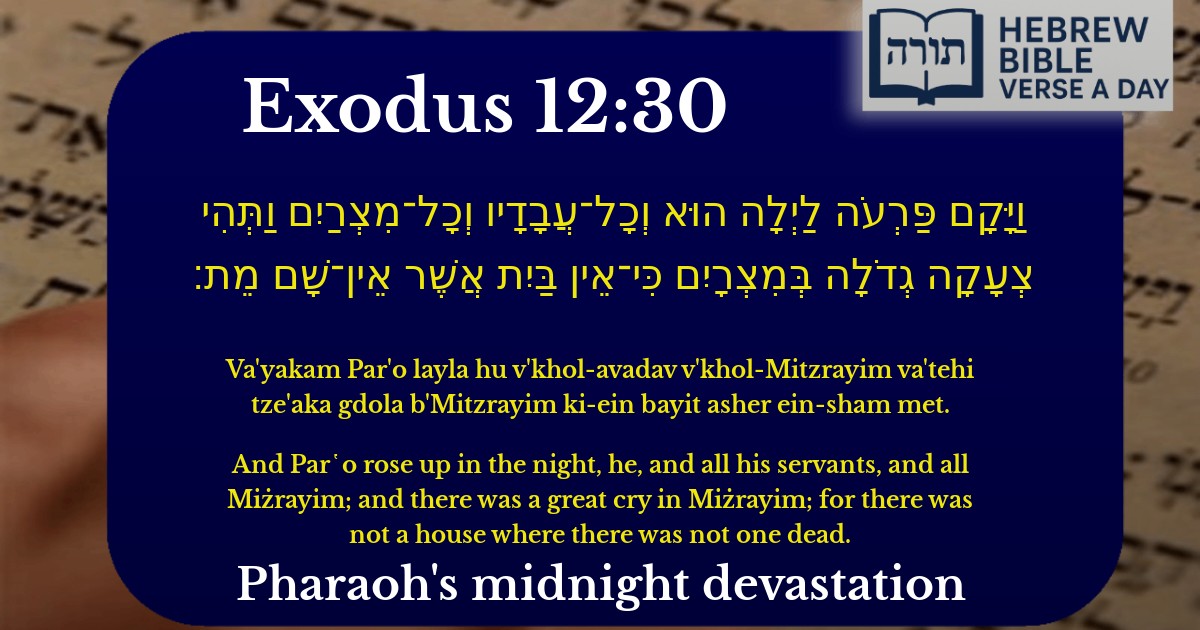Join Our Newsletter To Be Informed When New Videos Are Posted
Join the thousands of fellow Studends who rely on our videos to learn how to read the bible in Hebrew for free!
Hebrew Text
וַיָּקָם פַּרְעֹה לַיְלָה הוּא וְכָל־עֲבָדָיו וְכָל־מִצְרַיִם וַתְּהִי צְעָקָה גְדֹלָה בְּמִצְרָיִם כִּי־אֵין בַּיִת אֲשֶׁר אֵין־שָׁם מֵת׃
English Translation
And Par῾o rose up in the night, he, and all his servants, and all Miżrayim; and there was a great cry in Miżrayim; for there was not a house where there was not one dead.
Transliteration
Va'yakam Par'o layla hu v'khol-avadav v'khol-Mitzrayim va'tehi tze'aka gdola b'Mitzrayim ki-ein bayit asher ein-sham met.
Hebrew Leining Text
וַיָּ֨קׇם פַּרְעֹ֜ה לַ֗יְלָה ה֤וּא וְכׇל־עֲבָדָיו֙ וְכׇל־מִצְרַ֔יִם וַתְּהִ֛י צְעָקָ֥ה גְדֹלָ֖ה בְּמִצְרָ֑יִם כִּֽי־אֵ֣ין בַּ֔יִת אֲשֶׁ֥ר אֵֽין־שָׁ֖ם מֵֽת׃
וַיָּ֨קׇם פַּרְעֹ֜ה לַ֗יְלָה ה֤וּא וְכׇל־עֲבָדָיו֙ וְכׇל־מִצְרַ֔יִם וַתְּהִ֛י צְעָקָ֥ה גְדֹלָ֖ה בְּמִצְרָ֑יִם כִּֽי־אֵ֣ין בַּ֔יִת אֲשֶׁ֥ר אֵֽין־שָׁ֖ם מֵֽת׃
🎵 Listen to leining
Parasha Commentary
📚 Talmud Citations
This verse is quoted in the Talmud.
📖 Pesachim 116a
The verse is referenced in the context of discussing the Exodus from Egypt and the events of the night of the tenth plague, emphasizing the magnitude of the cry in Egypt.


The Midnight Awakening of Pharaoh and Egypt
The verse describes Pharaoh rising at night along with his servants and all of Egypt due to the plague of the firstborn. Rashi (Shemot 12:30) explains that Pharaoh was awakened from his sleep by the cries of the Egyptians, as the plague struck precisely at midnight (based on Shemot 12:29). The term "ויקם" ("and he rose") implies urgency, showing that even the king was powerless against Hashem's decree.
The Universal Mourning in Egypt
The phrase "כי אין בית אשר אין שם מת" ("for there was not a house where there was not one dead") is interpreted in several ways:
The Great Cry in Egypt
The "צעקה גדולה" ("great cry") reflects the overwhelming grief of the Egyptians. The Mechilta (Bo 12) emphasizes that this cry was unprecedented because:
Rambam (Hilchot Teshuvah 6:4) derives from this episode that sometimes divine punishment serves to awaken others to repentance, though for the Egyptians, it was too late.
Pharaoh's Personal Humiliation
The phrasing "הוא וכל עבדיו" ("he and all his servants") highlights that Pharaoh, who claimed divinity (see Yechezkel 29:3), was reduced to the same helpless state as his subjects. Sforno notes that this demonstrated the futility of his arrogance before Hashem.